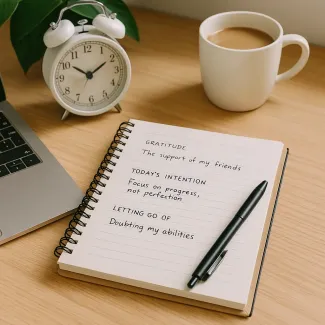
Rewire Your Mindset for Daily Growth and Clarity
How consistent routines reshape your self-belief and performance
Building confidence and sustaining productivity isn't about dramatic change. It’s about the small habits that accumulate into a steady rhythm of progress. These are the routines that help you silence limiting beliefs, those nagging thoughts that whisper you’re not good enough, smart enough, or capable enough. If you’ve ever hesitated before speaking up in a meeting, avoided a challenge, or doubted your decisions, you’ve encountered them. But you’re not stuck with them.
True transformation starts with recognizing that mental energy, like physical energy, needs intentional nourishment. Just as you wouldn’t expect to function optimally on poor sleep and junk food, you can’t expect your mind to thrive without healthy patterns of thought and action. Routines designed to sharpen your focus, regulate your emotions, and boost your inner trust can fundamentally reshape how you engage with the world.
Understanding limiting beliefs and how they take root
Limiting beliefs are deeply ingrained thoughts that shape your interpretation of yourself and the world. They usually form in early experiences—repeated criticism, past failures, or internalized social expectations. Over time, they become the lens through which you see every opportunity and challenge.
Common examples include:
- “I’m not a morning person, so I can’t be productive.”
- “I’ve never been good at public speaking.”
- “I don’t have what it takes to lead.”
Each of these thoughts seems harmless at first, but they act as psychological anchors, pulling you back just as you're ready to move forward. To change them, you need to interrupt the cycle—and that's where intentional, daily habits come in.
Morning routines that set the tone for inner power
Mornings offer a blank slate—a rare window to set your mood, energy, and focus before distractions creep in. One of the most powerful ways to rewire your thinking is to establish structured morning rituals that align your mind with your intentions.
Start by waking up without immediately reaching for your phone. Replace that habit with a few minutes of intentional silence. Whether you sit in meditation, practice deep breathing, or reflect on your goals, you send a strong signal to your brain: I’m in charge.
Adding journaling to your routine can bring remarkable shifts. Write down three things:
- What you’re grateful for
- What you intend to accomplish today
- What limiting belief you’re letting go of
By consciously identifying and naming your mental blocks, you weaken their hold. Over time, you’ll notice a shift: the thoughts that once dominated you begin to dissolve.
The power of micro-wins and self-reinforcement
Confidence doesn't come from success alone—it comes from recognizing your efforts consistently. The human brain is wired to respond to feedback. When you acknowledge even minor wins, you generate a chemical reward loop that reinforces positive behavior. This feedback isn’t external praise—it’s the voice in your own head saying, “I showed up. I did something hard. I followed through.”
This is why micro-wins are critical. These are small actions that move you closer to your goal, like choosing water over soda, sending that email you've postponed, or finishing your first paragraph of writing. When tracked and acknowledged daily, they become evidence against the narrative of not being capable.
Try a progress tracker on paper or digitally. Instead of setting giant outcomes, list daily intentions and mark off what you complete. Over time, the momentum builds, and your belief system begins to evolve to match your behavior.
Mental energy management through focus cycles
The mind doesn’t operate in a continuous straight line. It flows in cycles of focus and rest. To remain productive without burning out, learn to work with these natural rhythms.
Use techniques like the Pomodoro method—25 minutes of focused work followed by 5 minutes of rest. But go beyond the method and ask yourself: What kind of break recharges me? Is it standing and stretching? Walking outside? Deep breathing?
Cognitive fatigue sets in faster than physical tiredness. When you push through without mental recovery, your ability to make decisions, regulate emotions, and solve problems declines. Recharging intentionally throughout the day isn’t lazy—it’s strategic.
A daily brain refresh routine, such as taking 10 minutes to reflect mid-day or switching environments, can reset your focus and allow you to return to tasks with renewed energy.
Movement as a gateway to confidence and clarity
Physical movement has a direct impact on your mood, confidence, and cognitive performance. It doesn’t require hours at the gym. What matters most is consistency and intentionality.
When you move your body, you interrupt mental loops. You shift from overthinking to presence. Even a 15-minute walk in the morning or after lunch can enhance blood flow, regulate cortisol, and release dopamine—all of which improve your mental sharpness.
Certain movements, like yoga or tai chi, not only activate the body but bring awareness to breath and posture, both closely linked with confidence. Standing tall, breathing deeply, and taking up space physically retrains your nervous system to feel secure and powerful.
Try pairing affirmations with movement: Say “I am capable” during each stretch or “I’m growing stronger” as you walk. This combination of physical activation and verbal reinforcement deepens the rewiring process.
Language patterns and inner dialogue
Your brain listens to what you say—even when you’re not saying it out loud. The internal dialogue running through your day can either sabotage or support your goals. Begin by noticing your language, especially in moments of pressure.
Instead of “I have to,” shift to “I get to.”
Instead of “I always mess this up,” shift to “I’m learning how to handle this.”
These subtle shifts are powerful. They train your subconscious to expect growth instead of failure. Over time, your internal monologue becomes your greatest source of strength.
You can enhance this effect with a language detox challenge: Spend one week replacing negative self-talk with neutral or growth-oriented phrases. Keep a small notebook or app to jot down recurring limiting statements and consciously reframe them. The results are often startlingly quick.
Building emotional regulation into your day
Many limiting beliefs are driven not by logic, but by emotion—fear, shame, guilt, or anxiety. To dissolve them, you must strengthen your ability to regulate your emotional state throughout the day.
Start by using emotional check-ins at scheduled times. Ask yourself:
- What emotion am I feeling right now?
- Where do I feel it in my body?
- What triggered it?
This self-awareness weakens emotional reactivity and allows space for choice. Practices like box breathing (inhaling for 4 counts, holding, exhaling, holding) engage the parasympathetic nervous system and restore calm within minutes.
Don’t wait for emotional storms to practice this. Integrate it into daily transitions: before meetings, after intense tasks, or whenever you feel mentally fragmented. These micro-regulation rituals can dramatically boost your resilience.
Distraction detox and reclaiming attention
One of the biggest drains on both confidence and productivity is distraction. Every notification, every tab, every mindless scroll erodes your capacity to stay present with what matters.
Instead of relying on discipline alone, design your environment for focus. Set up distraction-free work blocks where devices are muted, notifications off, and a single task is in front of you. Use intentional friction—make it harder to access apps or websites that pull your attention.
Equally important is your emotional relationship to silence. Many people avoid focus because silence triggers discomfort. Build your tolerance by spending a few minutes in complete quiet daily. The stillness becomes fertile ground for clarity and confidence to grow.
Evening rituals to close the day with intention
The way you end your day determines how your mind prepares for the next. A scattered, reactive evening leads to a chaotic morning. But an intentional wind-down ritual primes your nervous system for recovery and integration.
Consider three phases:
- Digital sunset: Set a time to stop consuming news, emails, or social media. Let your mind start closing tabs.
- Reflection: Journal your wins, challenges, and insights. Write down what you’ll carry forward into tomorrow.
- Mental clearing: Use breathwork, light stretching, or visualization to calm your thoughts and reinforce your new beliefs.
These habits allow your subconscious to process the day productively, embedding positive experiences and dissolving old thought patterns.
Visualization and mental rehearsal for behavioral change
What you imagine repeatedly, your brain begins to accept as familiar. This is the foundation of mental rehearsal, a tool used by athletes, performers, and high-achievers across domains.
To rewire limiting beliefs, you can use daily visualization of your ideal self acting confidently. Picture yourself entering a challenging situation and succeeding. See the details—your body language, your tone, your mindset.
The key is to feel the outcome emotionally. When you mentally rehearse success with emotion, you accelerate neural adaptation. Your brain begins to align your behavior with the imagined outcome, reducing resistance and fear.
Pair this with affirmations that are specific, such as:
“I navigate uncertainty with calm clarity.”
“I trust myself to take the next step.”
“I am worthy of growth, not perfection.”
Creating a personal belief shift system
Ultimately, replacing limiting beliefs with empowering ones requires consistency and a system that works for you. This might include:
- Daily morning rituals to prime your mindset
- Journaling prompts to uncover hidden beliefs
- Progress tracking to celebrate momentum
- Movement to integrate body and mind
- Mental cues (post-it notes, alarms, visual triggers) to reinforce belief shifts
No single tool works for everyone. The magic lies in curating a set of routines that fit your lifestyle and revisiting them regularly.
When you live intentionally, reflect daily, and challenge old narratives, confidence becomes natural, not forced. And productivity becomes a side effect of inner alignment, not just external pressure.





